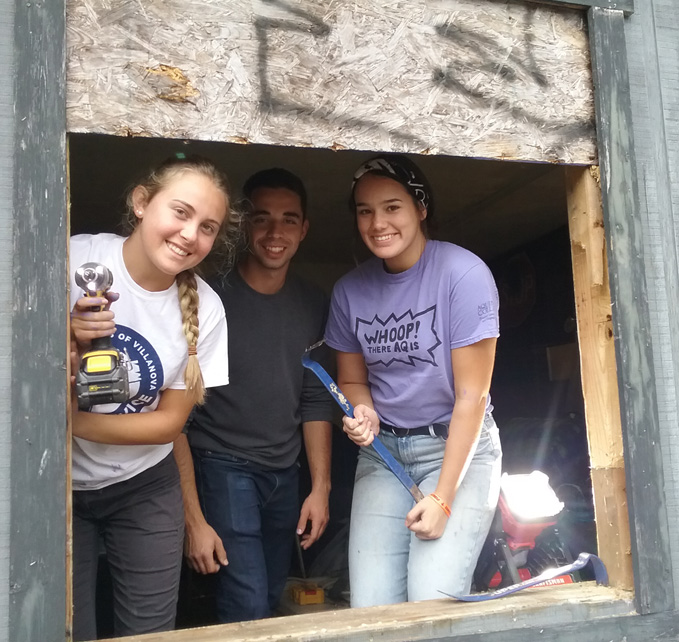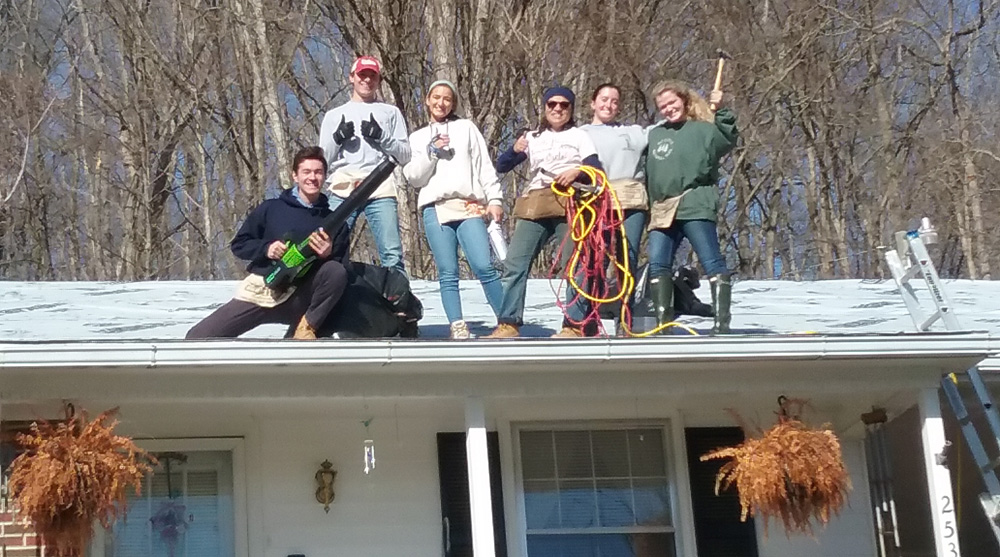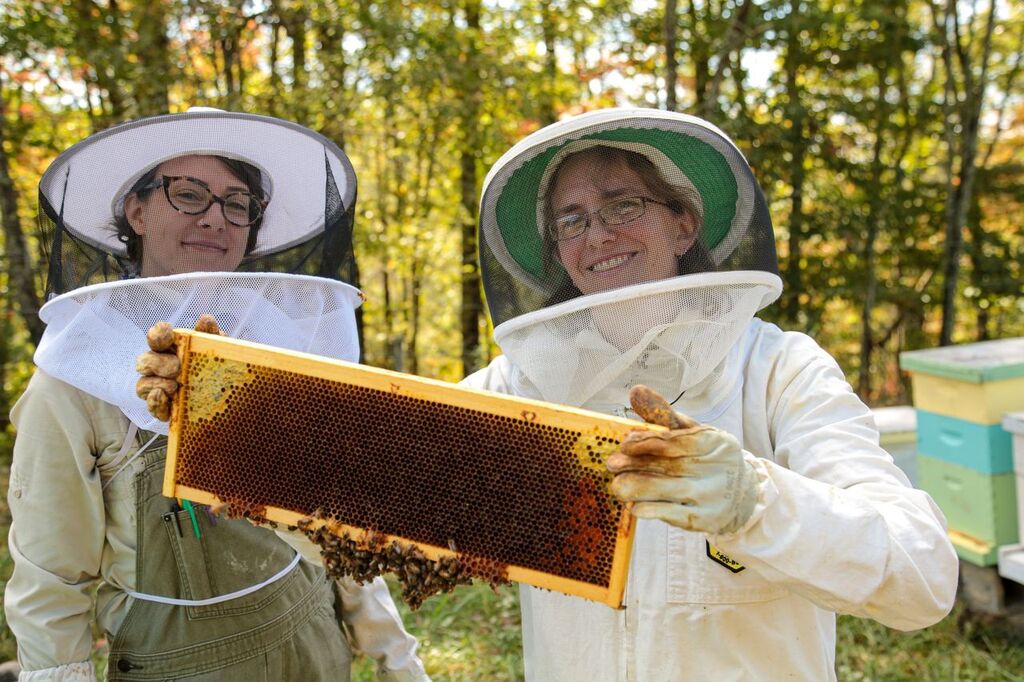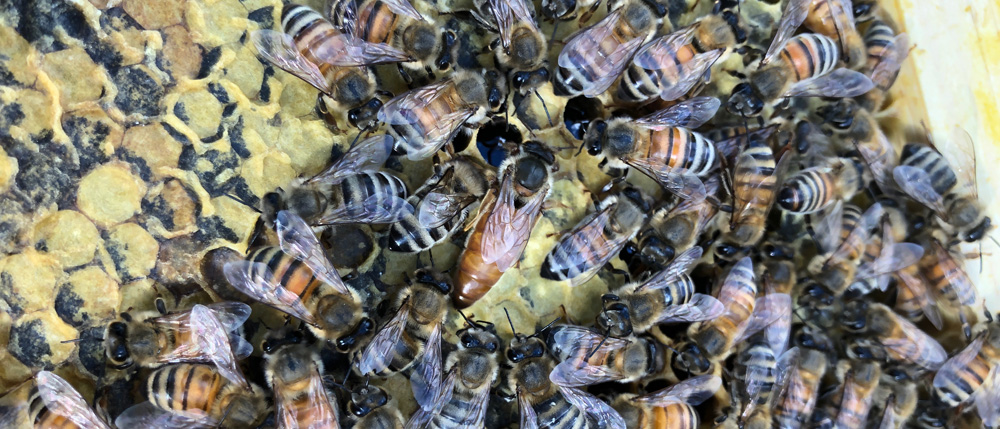|

Give a donation in honor of
Bethlehem Farm’s 15th Anniversary

State of the Farm Address
By Eric, Director
As we enter our 15th anniversary year, we look back on a momentous 2019.
Two Caretakers joined our community: Gemma Stanton and Tori Llorens. 364 service-retreat volunteers served with us over the course of the year. 35 Summer Servants graced our halls (4 more than last year) serving a total of 168 weeks (49 more than last year). Our healing presence in SE WV continued through our low-income home repair program. And Care for creation becomes more important with each passing year, as evidenced by our progress toward our Master Facilities Plan goals:
· Purchase of the Farm Property: this was
completed in May, in cooperation with the Diocese, and thanks to support from
many of you, “Welcome Home” has taken on a new meaning!
· San Damiano Center for Sustainability*: Framing was completed this summer, standing seam metal roof was completed this fall, and metal siding began this fall. No worries, there is plenty more work to be done when you come out this year (Click here to see a quick 2 minute time lapse slide show of the project).
· Solar Hot Water*: was installed in August with help from Farm friend Jeff Bohrer to cover both the Retreat House and Caretaker Residence, with future potential for solar heating of the buildings.
· Phase III of the Solar Electric Panels*: will
bring us to 100% solar electricity with partial battery back-up in spring 2020.
· Maintenance Garage/Tool Barn/Wood Shop/Picnic Shelter (still needs a name! St. Joseph’s??): The site has been prepared, topsoil removed for garden use, and we’re working on a foundation plan with a local engineer. Construction to begin in 2020, with your help. (Click here to contribute!)
· 18,000-gallon Rainwater Containment*: A 6-week dry spell this summer reminded us of the importance of this project, as we exhausted the rainwater stored in our
12,000-gallon rainwater containment and 5,000-gallon cistern, even with
water-saving measures in place. This additional 18,000-gallon containment is
planned for late 2020/early 2021.
*Special thanks to the Wheaton
Franciscans for their partnership in the San Damiano Center for Sustainability,
Solar Hot Water, Solar Electric Panel and rainwater containment projects. And
thanks to all of you for joining us with your time, talent, and treasure to
bring all the above into reality.
We only have to raise $143,000 to complete our
Rebuild My Church Capital Campaign and we have about $4,000 left to match from
the matching challenge. We hope to close out this capital campaign during our
15th anniversary year! Don’t forget that the first $4,000 given
toward that goal will be matched dollar for dollar by an anonymous donor.
Donate
now (or see our article below about monthly giving…)
Monthly Giving: Spread the love out all year long!
Monthly giving is an easy way to support the Farm each month, without having to plan for a large annual donation. If you are interested in joining the Monthly Giving Circle at Bethlehem Farm, then
Simply go to our online donation page (http://bethlehemfarm.net/give-monthly), enter your monthly pledge, and click “submit”.
OR
Some monthly donors set up an auto-monthly bill pay to
Bethlehem Farm in their online checking (to caretakers@bethlehemfarm.net or to “Bethlehem Farm, PO BOX 415, TALCOTT, WV 24981.”)
OR
Other monthly donors choose to write a check monthly and
mail it in to the above address
Monthly donors give between $5 and $1,000 each month. In FY2019, the monthly giving circle
contributed over $27,000, an important portion of overall giving.
We are in critical need of monthly donors at this
time, since five monthly donors have had to pause their recurring donations
recently due to financial stress (some good things, like buying a first home,
raising kids, and so on). Can you step up? Make a monthly pledge.
Why would you choose to be a monthly donor?
Some reasons that our donors choose to give monthly:
-
We decided that we needed to prioritize our faith not only in our time and actions, but also in our budget.
-
Each time we visit Bethlehem Farm and see the life-changing work that is going on there, we are inspired to give a donation.
-
This way our gift is an expense that is already factored into our spending, and prioritized above those extra dinners, cups of coffee and other luxuries.
-
We can't be at Bethlehem Farm participating in the mission daily, but we can live out our vocation in our own lives while still supporting and being a part of the work of Bethlehem Farm through our consistent giving.
-
Giving this way makes it easy for me to not forget.
-
Our sense of continued connection to our special experience at Bethlehem Farm and our desire to assist in affording the opportunity of that experience to others. The work done at the Farm is true evangelization.
-
Because I believe the farm is an apostolic community, living out the gospel message,
as authentically as possible.
-
Because we feel that Bethlehem Farm is an authentic way to propagate the gospel and
because we have seen just how far they can stretch resources towards living the gospel. $100 at Bethlehem Farm seems to go SO much further than we'd be able to stretch it ourselves.
-
I understand how real and alive the Spirit is working in the community.
-
Because of the speech Eric gives at the end of each group week about the
importance of tithing and how he and Colleen started this practice as
newly-wed grad students making next to nothing. And the Farm touched
me so deeply in so many ways, and was such a huge part of my life discernment,
that I want to make sure I am doing my part to help it continue to exist.
-
I see how the experience of the Farm continues to affect and form my students into
active, passionate, and engaged citizens and activists.
-
Because I believe in the mission. As a volunteer, I fell in love with the
community and as a Summer Servant, I was challenged in my faith. The decisions I make today - as a Catholic and as a teacher - are influenced by the Gospel cornerstones I learned to live at Bethlehem Farm.
-
As a way to tend to my spiritual garden, which does not get enough attention
otherwise.
-
It’s a monthly checkup of sorts for us to see how we are living the cornerstones where we live. Additionally we feel its very important for the Caretakers to know they are not alone in their work, that they have partners in their mission that they can count on each and every month to help support them, even in a small way.
Yes, I’d like to become a monthly
donor.
That sounds nice, I
can’t commit now, but here’s a one-time gift.
Commitment is key.
Your monthly
commitment assures us that we will have the resources we need to hire staff,
make promises to low-income families, and undertake sustainable upgrades around
the Farm and out in the community. We’ll keep you posted each month on recent
happenings and we can share prayer intentions with each other.
Monthly Giving Circle
Carrie &
Andrew Archual, Sue Augustus, Emma Baird*,
Matt Bono, Jay Carney, Liz Drapa*, Kara Feeley*,
Brent* & Amanda Fernandez, Alice Foreman*, Jim Gaffey, Adam & Kendra Goudreau, Hayley & Andrew Harmon, Zach* & Carley*
Haselhorst, Jenny Jeck, Michael* & Rachel* Kraus, Lauren LaCoy*, Pat
Lampton, Mariana Lo*, John & Chris Marasi, Mary Clare Mazzocchi, Scott*
& Kera* McNelis, Caitlin* & Aaron Morneau, Jennie* & Mike Motto Mesterharm,
Michael Newman*, Shannon O’Toole*, Kelsey & Jeromy Pajak-Menner, Lisa
Patterson, Sharyl Pels*, Mark & Cynthia Peters, Bob & Pat Rebollar,
Sarah & Tom Rooney, Dan & Ann Ruggaber, Rosanne & Tim Shovlin, Amy
& De Spurlock, Jake*
& Alicen Teitgen, Nick Vergatos, Katie
Wiggins*, Mary Williams, and Anna Wright-Ebbers*
*current and
former Caretakers, board members, and Summer Servants

Being God’s Hands at Teshla’s
By Steve, Caretaker
Anytime Bethlehem Farm Caretakers head to a worksite, we learn new skills and sharpen old ones throughout the home repair project. Teshla's site was no exception. My more important life learnings from this experience, however, go far beyond home repair skills. During my initial site visit to Teshla's home, I found a house that did not have a functioning bathroom and a bedroom that was structurally damaged and uninhabitable due to mold and mildew—each a result of the leaking roof in need of repair to stop further interior damage.
But why would a single Mom purchase such a home? As a single Mom, Teshla wanted, and more importantly, needed a home for her family of three, even if this home was all she could afford. I believe somehow, in her own spiritual journey, Teshla saw her pathway, and did not let the rough condition of this new home prevent her from taking care of her family the best she could; she knew that this was in fact only the first step on the path. That is where Bethlehem Farm was pulled into Teshla’s pathway, restoring her house in desperate need to a warm, healthy, and safe home for her young children and herself. For me, working with Teshla was less about learning technical skills, and more about witnessing the power of a mother’s love. I witnessed God’s hand of love and compassion working through us.

A Home Full of Story
By Victoria, Caretaker
On a warm afternoon in mid-January, Michael sits on his white
porch in his WVU sweatshirt and answers a few questions for me. Mike, as he
told me to call him 2 weeks ago when we started working with him to fix his
roof, is a West Virginia native to his core. He doesn’t remember a time before
his family lived in this area, and this specific house has been a part of his
family since his grandmother, Momaw, built it in the 1970s. He moved in with
her in 2014 when her health declined and they took care of each other. Mike was
a critical care paramedic and teacher for many years before being forced to
retire due to his own health issues. Over the course of the six days I shared
with Mike while putting his bright red metal up (he wanted his roof to stand
out), I learned of his kindness and care for others and had many laughs over
coffee and shared stories.
Thinking back on growing up in this area, Mike has vivid memories
linked to this house. He points out where he, his brother, and cousins would
play in the Greenbrier River about a quarter mile away while their parents sat watching
on the porch. The river reminds him of his grandfather, who died in March of
’85. That November was the first time the river really flooded, but it’s
happened a few more times since then and floods into the houses closer to the
river.
His Momaw would pick him up from school on Fridays in his youth,
and he would hang out with her through the weekend until she dropped him at
school and went to work at BF Goodrich, which used to be in the area. Sometimes
when he was at her house they would feel the dynamite blasts shake the windows
from mining at Snowflake Quarry down the road. He points to Flat Mountain in
the distance, where Momaw lived growing up. She was born in a coal mining camp
outside Logan County where her dad continued to work and send money to them up
on the mountain. His dad’s side of the family are locals also; his grandpa was
part Native American and his grandmother Irish. Mike has only one family member
who has moved out of the area, an aunt who now lives in Virginia. His family,
past and present, is West Virginian.
Mike’s story is rooted to this land and especially his Momaw’s
house. The mark of his grandparents remains all over this house, just as Mike
likes it. He has kept the old décor—wallpaper, green linoleum, white cabinets
with blue trim, lighthouse accents, and white place holders with lacy blue
trim—which I get to see when he invites us in from the cold on work days and
even makes a strong pot of coffee to share. Keeping his grandma’s décor in the
house, to him, means keeping his grandparents ever present. He can’t see the
kitchen without remembering the space they took up in it and the interactions
he shared with them. Mike tells a story of canning tomatoes with his
grandparents.
“We had everything going in the kitchen and zoned out in front of
the TV. A while later I asked Momaw what the smell was and we realized that we
had left the 20 quarts of tomatoes on the stove and they were now burning. We
laughed and laughed about that,” Mike recalls as we chuckle with him at the
story. Memories like these are what he keeps alive by maintaining his
grandparents’ presence through his surroundings.

Mike shared with every group of volunteers one of his grandmother's values: she did not want to leave any debt as a burden to others. Momaw could have fixed up the house, but she did not want to die and leave any debt. That’s simply the kind of integrity many people of her generation valued. Momaw lived a full and
holy life, taking care of herself and others into her old age. In the carport
where we work to ready the roof metal sits the push lawnmower she used on their
hilly front and backyards until she was 78—she wanted the job done correctly
and didn’t trust anyone else to do it right. Birds flit around the yard to
visit the numerous birdfeeders. Mike’s grandmother first put up the bird feeders,
but he continues to fill them.
“I like the birds to have a safe space and I enjoy their company.
Everyone asks me why I leave my dead ferns up in the winter, but that’s where
the Carolina Ren winters. More people should leave them up even if they think
it’s ugly,” Mike says.
Mike inherited his Momaw’s care and ability to take care of
others, despite his own health issues. He assists and cares for his other
grandmother who currently lives in Lewisburg. “I am so blessed to have been 45
with both my grandmothers alive and very involved in my life,” he acknowledges.
Mike’s mom first told his Momaw about Bethlehem Farm’s Repairing Homes, Renewing Communities program. Momaw passed a couple years ago, and Mike decided recently that it was time to work on the repairs his house needs. With financial and spiritual support from his Church, Mike applied to our program and we received the opportunity to work with him. Volunteers from the College of Mount Saint Vincent, St. Anselm College, and St. Paul University Catholic Center at UW-Madison joined us at Mike’s house the first week of January. They found themselves blessed to hear some of his story while they worked to help fix his roof. Mike was touched they chose to spend their breaks helping others.
“I looked them all up, all the schools to see where they are around the country. It was great hearing all their accents, even though they thought I had an accent. It was actually them,” Mike says. “I especially loved swapping stories with the paramedic and nursing students. I got to talk lingo with them.”
Mike is a man who has spent his life caring for others through his professional and general life. It was a joy getting know him and his Momaw through his stories and the marks she left on this home. As always, the simple act of listening and asking questions transforms repairing homes into renewing
ourselves and our communities. Putting this metal roof up means protecting a home full of story and family history.

Learning Our ABeeCs
By Colleen, Caretaker
As most visitors to the Farm know, we have happily kept
honeybees on the Farm for nearly the last 11 years. Caretaker Brian DeRouen and
I were the first adventurers to enter the world of beekeeping, supported by our
neighbors Anne and Mark. Over the years, many Caretakers have taken the role of
novice beekeeper and we learned, made blunders, ate sweet honey, watched the
bees pollinate our garden, and maintained a deep sense of awe for the bees through
it all.
In the winter of 2018 while checking the bees on a warm
day, I was devastated to find that neither of our beehives had made it through
the cold snap. It can be hard to know why beehives collapse, and I couldn’t
tell if it was beekeeper error, colony collapse disorder, or just a confluence
of tough weather patterns for bees. I realized in that moment just how much I
found joy in tending the bees—their loss hit me hard. It was the first time in
a decade that the Farm had no bees to care for.
Thus began our search for new bees to purchase. While it
is common to buy a “package” of bees and have them sent through the mail, my
preference was to buy bees as locally as possible, assuring that they were
suited for our climate and that it would benefit the local economy.
Unfortunately, the couple from whom we had bought our original “West Virginia
Buckfast” bees had retired from that work. I was struck by how difficult it was
to find a local source of starter hives, called “nucleus hives” or nucs. The
closest I could find was an apiary 3 hours north of us. We would have to pick
them up when called during the evening hours on an unspecified May or June date,
when the nucs were strong enough to move.
Then, we saw in the newspaper there was an “Intro to
Beekeeping” class offered near us at Sprouting Farms (a local farm incubator to
whom we send groups of volunteers a few times a year). Caretaker Raine and I
signed up quickly, hoping to learn and make connections for finding local bees.
During the short class, we learned of an opportunity for a more extensive
class, “Beekeeping 101,” offered by the Appalachian Beekeeping Collective (ABC).
If we took this class for five weeks, we could apply to be partners of ABC,
gaining mentorship, support, and loans of as many bee colonies as we could
handle. Raine and I again eagerly signed up, wanting to learn more beekeeping
skills and excited about the possibility of finding bees to tend.
The Appalachian Beekeeping Collective is a program of
Appalachian Headwaters, and their goal is to create economic opportunities for
rural families. They help members learn the art, science, and business of
earning a sustainable income through beekeeping. ABC trains new
beekeeper-entrepreneurs to maintain honey bee hives for profit. Beekeeping offers
a great way to earn a sustainable living in rural areas, but the start-up costs
and learning curve can be steep. The program provides the materials and support
necessary to overcome the considerable barriers to getting started. They keep
the continued costs of operating low through collective processing and marketing.
For us, this meant if we were accepted as partners, we
could have around four complete hives on loan to us, plus mentorship throughout
the beekeeping season and opportunities for continued classes. If one of our
ABC hives was strong enough to split in half, the new hive would move to
Bethlehem Farm bee boxes and become ours wholly, allowing us to build up our
own apiary. The only drawback we could see was we could only keep two jars of
honey; a program requirement was ABC buying back most of the honey. We decided
this was acceptable due to the program’s many great benefits, such as continued
mentorship and simply having bees on the Farm, pollinating our garden and
orchard, and adding goodness to the local ecosystem. Plus, if we had any
splits, in the next few years we should have some hives of our own from which
to harvest honey. If we wanted to get out of the program, we would simply give
the beehives back. If we wanted to be done with the program but keep the bees,
we could buy them from ABC, fulfilling our wish to have local bees. We became
the students in the front row of Beekeeping 101, excited to learn and become
eligible for this partnership opportunity.
Happily, we became ABC Partners in spring 2019. As I
drove to pick up our bees from the ABC facility 30 minutes away, I considered
how fun it would be to have four beehives, which was the most the Farm had ever
previously hosted. When I arrived, our mentor Kevin offered me eight hives,
four for me and four for Raine. Despite my inner voice of Raine cautioning me
against biting off more than we could chew, I couldn’t resist and accepted all
eight. With one cautionary sting on my nose, the ABC bees were loaded in our
truck and became our bees to care for.

Working with ABC has been a great experience. We can call
our mentor any time we have a question (a very valuable resource as a
beekeeper!), and he came out to teach us hands-on skills at least 5 times this
summer and fall. Since our hives were all new this year, the bees put a lot of
energy and resources into building up the wax honey comb in their homes—wax takes
ten times the nectar that honey does. They then filled those frames with honey,
yet we did not harvest any honey and instead left it all for the bees to eat
throughout the winter. Generally, hives don’t produce enough honey for
harvesting until at least the second year.
As we prepared the hives for the winter, we combined a
few which were not strong enough to make it through the winter, leaving us with
seven ABC hives and one Bethlehem Farm hive to brave the winter. Queen bees do
not lay eggs in the winter, so the population of the hive has to go into the
winter large enough to help the Queen survive until spring. This work entails
feeding and cleaning her and most importantly keeping her warm in the center of
a cluster of bees. The worker bees (all female) expend a lot of energy keeping
the Queen near 80 degrees, even when it is below freezing outside the hive. If
the Queen makes it through the winter, she will start laying eggs in the spring
and build up the hive again for the nectar season.
This January, I was able to peek at the bees on an
uncharacteristically warm 65 degree day. The absolute coldest temperature at
which you can open a hive without hurting the bees is 50 degrees. All eight
hives are still alive so far, and they were busy with their housekeeping tasks,
removing their dead sisters, taking “bathroom flights” (they don’t defecate in
the hive but rather hold it until they can leave on a warm day), and looking for
nectar. We have high hopes all eight hives will survive the winter and be ready
to help our garden and local ecosystem through pollination this spring. Perhaps
some of their hard work will also grace our table as we savor some very local
honey. We are thankful for our partnership with ABC and for our sweet,
hard-working friends, the bees.
|
|
|
|
|
Email Marketing By
|


|
|
|
|
|